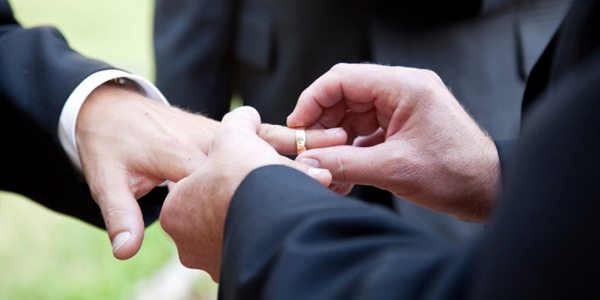Today U.S. District Court Judge John Sedwick ruled against Arizona’s constitutional amendment banning marriage equality, making Arizona the latest state to see such a ban struck down in court since the U.S. Supreme Court handed down its historic marriage rulings last June.
“This is a wonderful day for Arizona,” said Phoenix Mayor Greg Stanton. “Today’s ruling confirms what we have known for so long: that same-sex couples have a right to equal protection under the law. This did not happen on its own — many people across our country have worked tirelessly to demand justice for all, and we owe a debt of gratitude to those in Arizona who have fought to overturn Arizona’s ban. Now that a federal court has ruled Arizona’s ban unconstitutional, there is no justifiable reason for the state Attorney General and county clerks to delay issuing marriage licenses to same-sex couples who want to marry.”
In Connolly v. Jeanes, brought by private counsel, and Majors v. Horne, brought by Lambda Legal, on behalf of same-sex couples, Judge Sedwick rejected Arizona’s ban on marriage equality saying it violated the U.S. Constitution. Judge Sedwick was nominated by President George H.W. Bush.
“Yet again, today’s court rulings affirm there is no justifiable reason to keep these discriminatory marriage bans on the books,” said Human Rights Campaign (HRC) Legal Director Sarah Warbelow. “Laws prohibiting same-sex couples from marrying serve no purpose other than to harm Americans who simply want to protect and provide for themselves and their families. Ultimately the U.S. Constitution does not allow states to continue discriminating against committed and loving gay and lesbian couples.”
Judge Sedwick declined to issue stays in the rulings pending appeal.
A full feature map on the current state of marriage equality can be found here.
On Monday, October 6th, the nine justices of the Supreme Court announced they had declined to hear any of the cases pending before them challenging state bans on marriage for same-sex couples. This allowed the circuit court decisions striking down the bans to stand, meaning same-sex couples in Utah, Oklahoma, Virginia, Wisconsin and Indiana could legally marry. In addition, it left in place the circuit court rulings striking down same-sex marriage bans from the Fourth, Seventh and Tenth Circuits.
On Tuesday, October 7th, a three-judge panel for the United States Court of Appeals for the Ninth Circuit (which covers Arizona) unanimously ruled that state bans on marriage for same-sex couples are unconstitutional in Idaho and Nevada. That same day, the stay on the court ruling in Colorado was lifted, allowing same-sex marriage to proceed. On Thursday, October 9th, West Virginia’s Attorney General agreed to stop defending the state’s ban, bringing the total number of states with marriage equality to 28, plus Washington, DC.
On Friday, October 10th, a federal district judge ruled against North Carolina’s constitutional amendment banning marriage equality, and on Sunday, October 12th, a federal district judge ruled Alaska’s same-sex marriage ban as unconstitutional. The Ninth Circuit’s temporary stay of Alaska’s marriage equality decision is due to expire later today. These decisions bring the total number of states with marriage equality to 31, plus Washington, DC.
With today’s decision, same-sex couples are now able to marry in 31 states and Washington, DC, including: Alaska, Arizona, California, Colorado, Connecticut, Delaware, Hawaii, Idaho, Illinois, Indiana, Iowa, Maine, Maryland, Massachusetts, Minnesota, Nevada, New Hampshire, New Jersey, New Mexico, North Carolina, New York, Oklahoma, Oregon, Pennsylvania, Rhode Island, Utah, Vermont, Virginia, Washington, West Virginia, Wisconsin.
Gallup puts support for marriage equality at 55 percent – an astonishing 15 point increase from just 5 years ago – with other polls showing support at even higher margins. And support for same-sex marriage rights continues to grow in virtually every demographic group. According to ABC News / Washington Post, 77 percent of adults under age 30 favor marriage equality. 40 percent of Republicans – an all-time high and jump of 16 points in under two years – now support marriage for gay and lesbian couples, while the number of Catholics supporting marriage has grown to 62 percent,according to the New York Times. These numbers continue to grow, with no indication that support will slow down.




